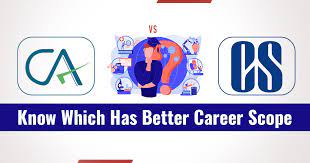
General Difference Between Chartered Accountant and Company Secretary
Beginning with the General Difference Between Chartered Accountant and Company Secretary :
Chartered Accountants (CAs) and Company Secretaries (CSs) are both professionals who play a crucial role in ensuring the smooth functioning of businesses. However, their roles and responsibilities differ significantly.
Chartered Accountants are experts in accounting, auditing, taxation, and financial management. They help businesses in financial planning, auditing, and taxation, among other things. CAs are responsible for maintaining financial records, providing financial advice, and ensuring compliance with various financial regulations.
On the other hand, Company Secretaries are responsible for managing the legal and regulatory aspects of a company. They are responsible for ensuring that the company complies with legal and regulatory requirements and manages the company’s corporate governance. CSs are responsible for maintaining company records, managing board meetings, and ensuring that the company complies with corporate laws and regulations.
In summary, Chartered Accountants are financial experts, while Company Secretaries are experts in corporate governance and regulatory compliance. While their roles may overlap in some areas, their primary responsibilities are different.
Table of Contents
Main Difference Between CA and CS
Chartered Accountants (CAs) and Company Secretaries (CSs) are both professionals who play a crucial role in ensuring the smooth functioning of businesses. While their roles may overlap in some areas, their primary responsibilities are different.
Role of Chartered Accountants: Chartered Accountants are financial experts who have extensive knowledge and expertise in accounting, auditing, taxation, and financial management. They help businesses in financial planning, auditing, and taxation, among other things. Some of the key responsibilities of CAs are:

- Accounting and Bookkeeping: CAs are responsible for maintaining accurate financial records of the company.
- Auditing: CAs audit the financial statements of a company to ensure compliance with financial regulations and guidelines.
- Taxation: CAs help businesses in tax planning, ensuring compliance with tax regulations, and filing tax returns.
- Financial Management: CAs assist businesses in financial planning, budgeting, and managing cash flows.
- Advisory Services: CAs provide financial advice to businesses on issues such as investments, mergers and acquisitions, and financial risk management.
Role of Company Secretaries: Company Secretaries are experts in corporate governance and regulatory compliance. They ensure that the company complies with legal and regulatory requirements and manages the company’s corporate governance. Some of the key responsibilities of CSs are:
- Legal Compliance: CSs ensure that the company complies with various laws and regulations, including company law, securities law, and labour laws.
- Corporate Governance: CSs manage the company’s board of directors and ensure that the company follows good governance practices.
- Record-Keeping: CSs maintain the company’s statutory registers, minutes of meetings, and other important documents.
- Disclosure and Reporting: CSs are responsible for ensuring that the company makes timely and accurate disclosures and reports to regulatory authorities.
- Secretarial Services: CSs provide secretarial services to the company, including organizing board meetings, drafting minutes of meetings, and managing communication with shareholders.
In summary, while both CAs and CSs play crucial roles in the functioning of businesses, their primary responsibilities are different. CAs are financial experts who assist businesses in financial planning, auditing, and taxation, while CSs are experts in corporate governance and regulatory compliance, ensuring that the company complies with legal and regulatory requirements.

Key Difference Between Chartered Accountant and Company Secretary
| Chartered Accountants (CAs) | Company Secretaries (CSs) | |
|---|---|---|
| Role | Financial expert | Corporate governance and regulatory compliance expert |
| Responsibilities | Accounting and bookkeeping, auditing, taxation, financial management, advisory services | Legal compliance, corporate governance, record-keeping, disclosure and reporting, secretarial services |
| Expertise | Accounting, auditing, taxation, financial management | Corporate governance, legal and regulatory compliance |
| Qualification | Completion of Chartered Accountancy course | Completion of Company Secretaryship course |
| Professional Body | Institute of Chartered Accountants of India (ICAI) | Institute of Company Secretaries of India (ICSI) |
As the table shows, while both CAs and CSs play important roles in the functioning of businesses, their primary responsibilities, expertise, and qualifications are different. Chartered Accountants are financial experts responsible for accounting, auditing, taxation, financial management, and advisory services, while Company Secretaries are experts in legal compliance, corporate governance, record-keeping, disclosure and reporting, and secretarial services. CAs are associated with the Institute of Chartered Accountants of India (ICAI), while CSs are associated with the Institute of Company Secretaries of India (ICSI).
Similarities Between CA and CS
Here are some similarities between Chartered Accountants (CAs) and Company Secretaries (CSs) apart from difference between CA and CS
- Professional courses: Both CA and CS are professional courses that require rigorous training and exams to be passed.
- Corporate knowledge: Both professionals have in-depth knowledge of corporate operations, law, and regulations.
- Compliance: Both CA and CS play an important role in ensuring compliance with laws and regulations in their respective areas of expertise.
- Advisory role: Both professionals provide advice and support to the management team of a company.
- Ethics: Both CA and CS are required to uphold high ethical standards and maintain integrity in their work.
- Cross-functional: Both professionals work closely with other departments in a company to ensure the smooth functioning of operations.
- Career progression: Both CA and CS offer excellent career opportunities and prospects, with scope for growth and advancement in the corporate world.
Example to understand the difference between Chartered Accountant and Company Secretary
Let’s take the example of a large manufacturing company to understand the difference between a Chartered Accountant and a Company Secretary in more detail.
Role of Chartered Accountants: A Chartered Accountant in this company would be responsible for maintaining accurate financial records, providing financial advice, and ensuring compliance with various financial regulations. They would be involved in financial planning, budgeting, and managing cash flows. The CA would also be responsible for auditing the company’s financial statements and ensuring that they comply with financial regulations and guidelines. For example, the CA would ensure that the company’s tax returns are filed on time and that the company complies with accounting standards.
Role of Company Secretaries: A Company Secretary in the same company would be responsible for ensuring that the company complies with legal and regulatory requirements and manages the company’s corporate governance. They would be responsible for maintaining the company’s statutory registers, minutes of meetings, and other important documents. The CS would also ensure that the company follows good governance practices, manages the board of directors, and communicates with shareholders. For example, the CS would ensure that the company complies with corporate laws and regulations and that the company’s board meetings are conducted in accordance with legal requirements.
In summary, while the CA would focus on financial aspects of the company, such as accounting, auditing, taxation, and financial management, the CS would focus on legal and regulatory aspects, such as compliance with corporate laws and regulations, maintaining company records, managing board meetings, and ensuring good corporate governance practices.
In practice, many large companies have both CAs and CSs on their teams to manage the financial and legal aspects of the business. Together, these professionals ensure that the company operates smoothly and complies with all relevant laws and regulations.
Example 2
Let’s take the example of a large multinational company to understand the differences between Chartered Accountants (CAs) and Company Secretaries (CSs) in detail.

Role of Chartered Accountants: Chartered Accountants would be responsible for managing the financial operations of the company. They would maintain the company’s financial records, prepare financial statements, and provide financial advice to the management. They would also be responsible for ensuring that the company complies with financial regulations and guidelines. For example, CAs in a multinational company may be responsible for:
- Accounting and Bookkeeping: CAs would be responsible for maintaining accurate financial records of the company in compliance with international accounting standards.
- Auditing: CAs would audit the financial statements of the company and provide an independent opinion on the accuracy of the financial statements.
- Taxation: CAs would ensure that the company complies with international tax regulations and provide advice on tax planning and optimization.
- Financial Management: CAs would assist the management in financial planning, budgeting, and managing cash flows.
- Advisory Services: CAs would provide financial advice to the management on issues such as investments, mergers and acquisitions, and financial risk management.
Role of Company Secretaries: Company Secretaries would be responsible for managing the legal and regulatory aspects of the company. They would ensure that the company complies with various laws and regulations and manages the company’s corporate governance. For example, CSs in a multinational company may be responsible for:
- Legal Compliance: CSs would ensure that the company complies with international laws and regulations, including company law, securities law, and labour laws.
- Corporate Governance: CSs would manage the company’s board of directors and ensure that the company follows good governance practices.
- Record-Keeping: CSs would maintain the company’s statutory registers, minutes of meetings, and other important documents.
- Disclosure and Reporting: CSs would be responsible for ensuring that the company makes timely and accurate disclosures and reports to regulatory authorities.
- Secretarial Services: CSs would provide secretarial services to the company, including organizing board meetings, drafting minutes of meetings, and managing communication with shareholders.
In summary, CAs and CSs have different responsibilities in a multinational company. While CAs are responsible for managing the financial operations of the company, CSs are responsible for managing the legal and regulatory aspects of the company. Together, they ensure that the company complies with all laws and regulations and operates efficiently and effectively.
References for Difference Between CA and CS
- https://indianexpress.com/article/education/ca-versus-cs-which-course-is-better-for-commerce-students-expert-advices-8168394/
- https://www.quora.com/What-is-the-difference-between-Cs-and-Ca

